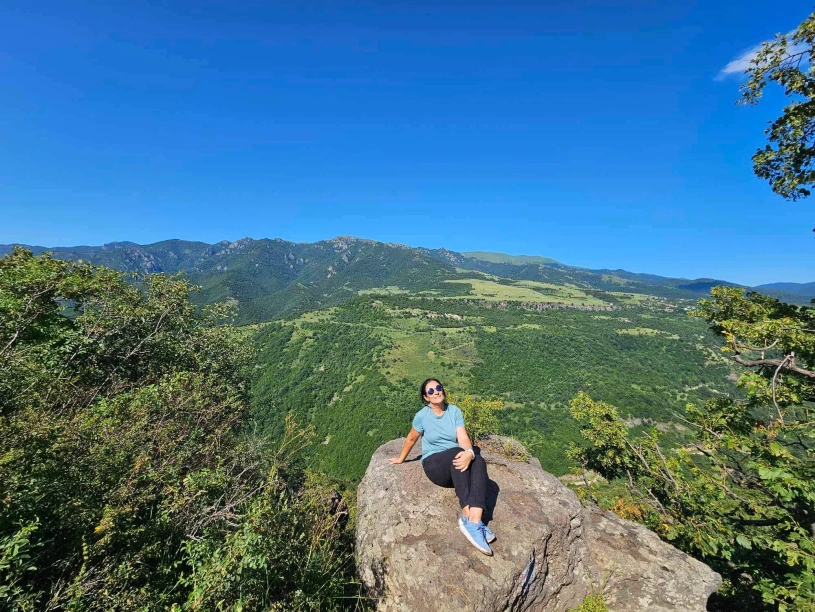Mkhitar Sebastatsi Educational Complex has always emphasized research work as an important component of the author educational program.
First of all, it has been emphasized the researcher teacher is ready and wants to research, make new discoveries and analyze and present his/ findings. The basis of teacher entry camps, professional trainings, teacher clubs, and other group trainings being implemented, developed and organized in the EduComplex is the raising, discovery, encouragement and development of the teacher’s research skills. For years, the pedagogical magazine “Dpir” of the EduComplex has united and unites hundreds of research teachers, disseminating research teachers’ developments, encouraging their activities. In the order of annual awards given to author teachers (determined by the author educencational program, fixed by the educational calendar), the researcher teacher himself/herself is highlighted, his/her ability to research is emphasized and encouraged.
The system of voluntary certification of teachers was developed and fully implemented in the educational complex in 2022-2023. At the basis of our approach is the importance of just these qualities of the teacher: considering teaching as a profession and preparing the teacher to be a creator and researcher, as a result, encouraging such teachers. This is important to understand and to accept. This approach is systemic in the Mkhitar Sebastatsi Educational Complex: it is not just words, which may sound good as expressions, but, at the same time, completely different skills are considered to be important. The best expressions and wishes written on paper may remain on paper if other skills are valued and appreciated. This is the core of our pedagogy: a non-researching teacher cannot have researching students. It will be a closed circle. As a result, we will have a teacher who memorizes, who alienates the responsibility and mental work, reading and studying. For such a teacher, it will be comfortable to have students who are used to memorizing and repeating, in other words reproducing (and only within the permitted limits).
We cannot see innovation and development in education if we do not see and care about these seemingly simple things. The teacher’s work should become interesting, creative, and yes, also well-paid, so that the young person wants to work at school. By creating the image of a teacher who is oppressed, works in a closed system and is constantly labeled, we came to the reality that schools today have a visible and gradually increasing shortage of teachers.
I don’t know why, but a stereotype has been created in the society that the teacher is ignorant, that only the weakest student goes to work at school (this is also a question, why should a weak student graduate from university?) Who has this situation been created by? Why has this situation been created? Yes, it is difficult to work with a research teacher, because that teacher will demand a decent salary for his work, will have his own opinion, his own approaches, but let’s admit that we need this kind of a teacher: an independent, self-confident, creative and thinking teacher who will bring a new culture. We need a new and thoughtful teacher, and it is this teacher who will be able to guide and lead the education of the generation marching with the time.
This is the researching teacher, with his constant desire to learn and research. He is open to new skills, and his outward appearance is in line with the times. Researching students gather around such a teacher.
In 2022, the procedure for conducting research work by the student was fully introduced, and developed in the Pedagogical Laboratory of the educational complex, tested in several stages, revised and started to be implemented in the research high school of the EduComplex. With the consistent efforts of the head of the Research High School and teachers, the research work in the school became one of the important and key developments, attracting the students, having unexpected developments. Most of the students were excited by this work. It turned out that there were many topics that the students wanted to propose, and those topics were quite interesting. Teachers also worked specifically on many topics because they can’t supervise a research paper without carrying out research work. Many topics were new to the teachers, modern and not having been explored. So supervising research paper became interesting work.
Already in the new academic year, the results were studied, additions to the order were proposed. It was noted that the research work was an important contribution to the development, further course and activity of the Research High School.
The topics of the research work with their descriptions are published in the teacher’s blog, discussed and clarified in the relevant laboratories. The head of the Research High School gives students the opportunity to get to know the presented topics better. They can also propose their own topic and choose the supervisor. Already in September we have a clear picture. Each student chooses his/her topic, supervisor and starts working.
According to the order, the work schedule, topics, students’ names, and other details related to the work are published on the supervisor’s.
During the first months students determine the general content of their work, begin to find and study the material. Questions arise and some amendments are made. The actual work may last until the end of the year. The first defenses begin already in November-December.
Public presentations are important for learners and teachers. They are open platforms where the students demonstrate their skills in public presentations, oral speech, presentation of the content of the material, answering questions and in other skills. These are also important from the point of view of presenting and defending the student’s work to others. The role of the reviewer, who reads, studies the work, and in many cases also supports the student, is also important.
Research work brought a new culture and new interests to academic work.
Translated into English by Yura Ganjalyan

